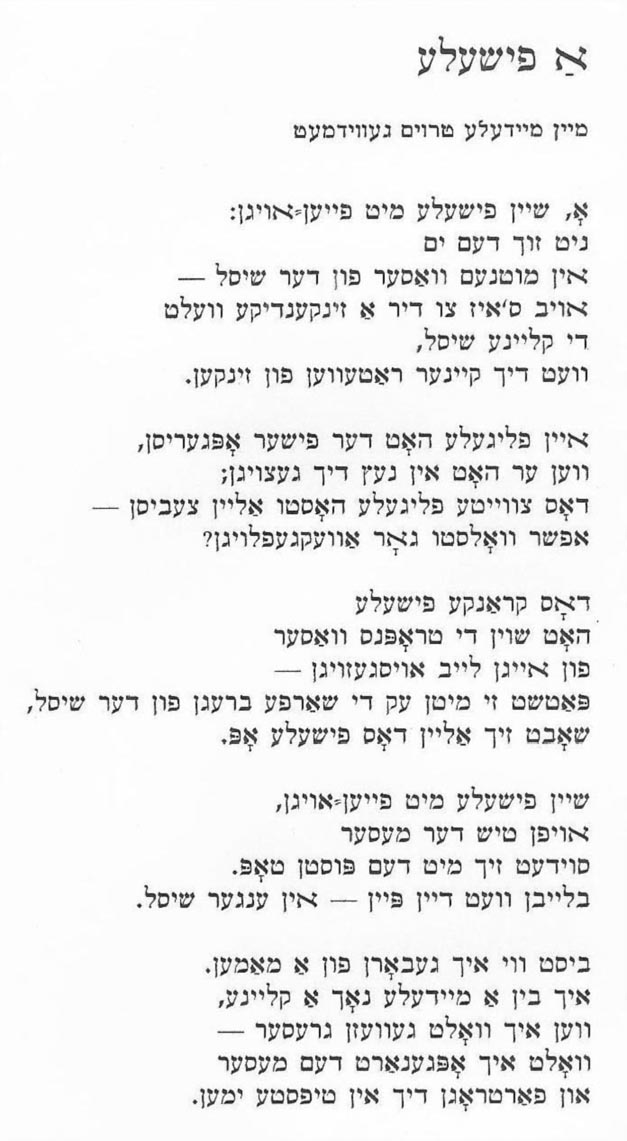
Der Bay
June–August 2005, Vol. 15, No. 6, p. 8-9
Menke: The Complete Yiddish Poems of Menke Katz
Translated by Benjamin & Barbara Harshav
Review by Philip Fishl Kutner
This 914-page book is a literary and historical gem. Menke Katz (1906-1991) was unique, for he published nine books of poetry in Yiddish and also nine others in English. Thus he was the foremost American poet who published both in English and in Yiddish.
This book is divided into distinct sections:
o It starts with a remembrance of Menke by his long-time collaborator, Harry Smith. Smith notes that Menke's "English poetry was equally important to world literature."
o There are three maps; one is of the area in which Northeastern Yiddish was spoken, also known as Líte or Jewish Lithuania. A second map is of important places in which Menke lived. They include" Vilne area; Safad, Israel; Brooklyn and the Lower East side of Manhattan; and finally Spring Glen in upstate, New York. The final map is the geography around Vílne.
o Menke's son, Professor Dovid Katz, includes a 135-page biography and times of his father's life and period that includes three-dozen photos. This is of great historical significance. Menke was a very unusual character. His marriages, dress and vegetarian lifestyle all combined to accent his Bohemian-like behavior. Likewise his interest in Kabbalah and folklore was a reflection of his character.
o The last section of this book, and the major portion, is the Harshavs' translations of the Yiddish poems in the nine Yiddish books.
Extending his arms up and out in the form of a broad letter V was a characteristic gesture shown in color on the back and at a younger age on page cxxvi. Even his signature on the book's jacket showed his artistic bent.
Menke used several unusual poetic styles. Over time poetic styles have varied. Shakespeare's use of the sonnet (although not invented by him) is an early example. Later examples are the limerick, quatrains, cinquains and the Japanese nature-cantered haiku. Perhaps Menke's style was influenced by others, for in the 20th century there was the popularity of the free form, open form or free verse (absence of a definite pattern or rhyme). Menke later utilized an unusual poetic style. His use of triangular shapes in some of his later poetry is another example of creative genius. The Harshav's did an excellent job of translating these Yiddish poems into English and maintaining their trueness.
Menke's Yiddish poetry books were:
Dray shvéster
Der mentsh in togn
Brénendik shtetl, bukh I
Brénendik shtetl, bukh II
Brénendik shtetl, bukh III
S'hot dos vort mayn bóbe Móyne
Tsu dertséyln in freydn
Der pósheter khólem
Inmítn tog
Nachman Mayzel in his tome, Amerike in yidishn vort: antologye included Menke's poem "Der tate in zayd fabrik" on page 842.
In the Yizkor Book, Sefer zikaron le-esrim ve-shalosh kehilot she-nehrevu be-ezor Svintsian, the editor, Shimon Kanc includes Katz's poem "Svintsyan: Heersha-Leyb Tarshish." Menke wrote of Svintsyan-his birthplace.
On the next page is the poem, "Fishele," selected because it has sentimental value for the reviewer and the trasliterator. It is on Page 147 of the book.
Because of its size, and scope, it is a must for all Judaica libraries, and serious collectors of Yiddish related writings.
The reference for the book is:
Menke: The Complete Yiddish Poems
Translated by Benjamin and Barbara Harshav, The Smith: NY 2005, 914 pp.
ISBN: 1-882986-21-0, $35.00
email: Thesmith1@aol.com
"A Little Fish" is found on page 147 of the Harshavs' translations in Menke: The Complete Yiddish Poems of Menke Katz, with the translations by Benjamin and Barbara Harshav. The Yiddish text is found on page 105 of Der mentsh in togn. Troim is well-known in Yiddish circles for her publication of Yiddish poetry and is very active as a speaker on the Yiddish circuit. Along with her husband Frank Handler they live half a year in Florida and the other half in New Jersey.
This poem was dedicated to Menke Katz's little girl, Troim, a name which means "grand aspiration" in Yiddish. This poem shows his commitment to ethical vegetarianism.
A Little Fish
For my little girl Troim
O pretty fish with fairy eyes,
Do not seek the sea
In the muddy water of a bowl.
If the little bowl
Is a sinking world,
No one will save you from sinking.
The fisherman tore off one wing
When he pulled you in his net,
The second wing you bit yourself–
Maybe you could have flown away?
The sick fish
Sucked out of its body
All the drops of water,
Now she slaps The sharp shores of the bowl,
Scrapes her own scales.
Pretty fish with fairy eyes,
The knife on the table
Whispers secrets to the empty pot.
What remains is your anguish–in the narrow bowl
Like me, you were born of a mother.
I am still a tiny girl.
If I had been bigger,
I would have cheated the knife
And carried you to the deepest sea.
A fishele
Mayn meydale Troim gevidmet.
O, sheyn fishale mit feyen oygn:
Nit zukh dem yam
In mutnem vaser fun der shisl–
Oyb s'iz tsu dir a zinkendike velt
Di kleyne shisl,
Vet dikh keyner rateven fun zinken.
Eyn fligale hot der fisher opgerisn,
Ven er hot in nets dikh getsoygn;
Dos tsveyte fligale hostu aleyn tsebisn– Efsher volstu gor avekgefloygn?
Dos kranke fishale
Hot shoyn di tropns vaser
Fun eygn layb oysgezoygn–
Patsht zi mitn ek di sharfe bregn fun der shisl, Shobt zikh aleyn dos fishale
op.
Sheyn fishale mit feyen oygn,
Afn tish der meser
Soydet zikh mit dem pustn top.
Blaybn vet dayn payn–in eygner shisl.
Bist vi ikh geborn fun a mamen.
Ikh bin a meydale nokh a kleyne,
Ven ikh volt geven greser–
Volt ikh opgenart dem meser
Un fartrogn dikh in tifste yamen.
THE TEXT IN THE ORIGINAL YIDDISH:
